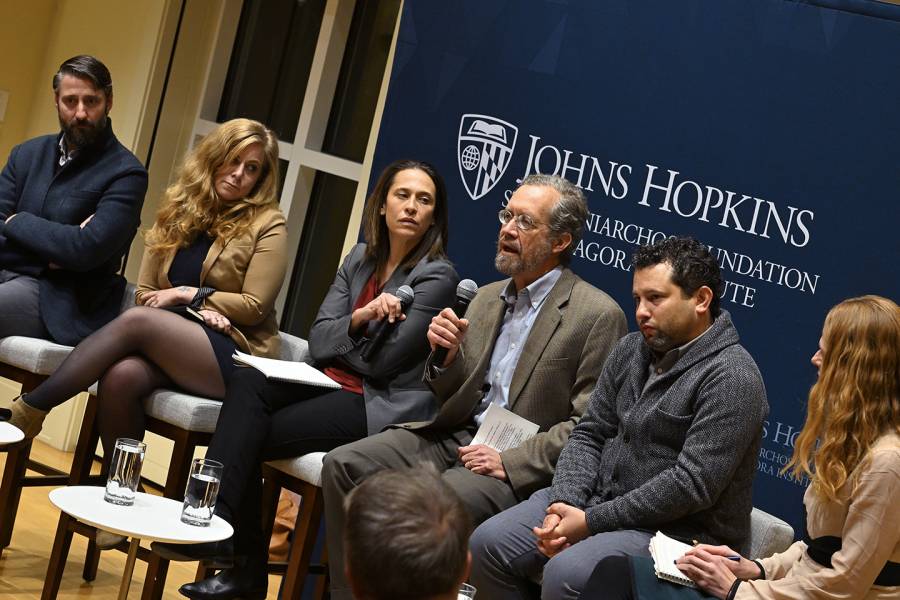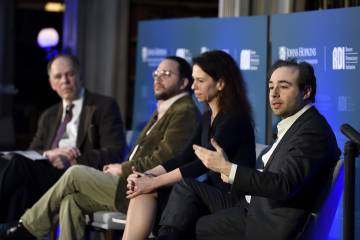The scourge of disinformation associated with the 2016 election was just the tip of the iceberg compared to what we'll see in 2020, panelists predicted at a Johns Hopkins University forum on Tuesday.
"It's going to be a complete mess this election cycle," Politico reporter Nancy Scola said of the social media forces at play internationally and domestically in politics.
The journalists and scholars who convened for Tuesday's roundtable warned that the big tech platforms—Facebook, YouTube, Google, and Twitter—aren't prepared to handle that mess.
"It just seems like technology is outrunning old institutions like elections," said Scott Shane, reporter for The New York Times' Washington bureau and part of the team that won a Pulitzer Prize in 2018 for its reporting on Russian interference in the 2016 presidential election.
Wednesday's forum, Digital Media in the 2020 Election, was co-hosted by the Stavros Niarchos Foundation Agora Institute at Johns Hopkins University along with the Center for Information, Technology, and Public Life at UNC Chapel Hill.
The roundtable grew from an ongoing research effort called Digital Political Ethics, which focuses on issues of electoral fairness and integrity. The group of scholars includes JHU political science professor Adam Sheingate, Jesse Baldwin-Philippi of Fordham University, and Daniel Kreiss of UNC Chapel Hill. The latter two attended Wednesday's forum.
The group plans to publish a report in January based on interviews with more than a dozen political consultants, aiming to offer a sort of "benchmark of standards" for campaigns, Kreiss said.
Among the topics the experts discussed:
Deception originates both at home and abroad
Shane discussed Russia's interference in the 2016 election, a topic on which he has reported extensively.
"For the most part, they did a spectacular job of imitating Americans on social media," he said. "They played every card brilliantly."
But Russia isn't the only one to watch when it comes to fraudulent content, the panelists warned—it's happening in the U.S., on both sides of the aisle.
Shane pointed to the "Dry Alabama" campaign that emerged for the 2017 Senate race between Doug Jones and Roy Moore. The campaign appeared to support Moore, but was actually the covert creation of progressive Democrats hoping to scare the business community away from the conservative candidate.
Beyond fake ads, there are "content mills of hyper-partisan information," said Slate journalist April Glaser, pointing to networks of pro-Trump Facebook pages producing viral memes.
New models of campaigning
The Obama campaign was a prime example of an old-school style of organizing, with "a corporatized structure," central headquarters, and trained staffers, said Sasha Issenberg, author of The Victory Lab: The Secret Science of Winning Campaigns.
Today's campaigns are more likely to skip that "long, slow process" of organizing in favor of capitalizing on surges of excitement for new candidates. As Issenberg wrote in Politico, Beto O'Rourke's campaign in Texas exemplified this new "hyperscale" style—"flexible enough to expand at exponential speed, paired with an understanding that getting big quickly can excuse and justify all kinds of other shortcomings."
The Wild West of Silicon Valley
With no firm regulations in place—and a morass of legal and ethical complexities to wade through—tech giants like Facebook and Twitter are unable to keep up with the demands of controlling disinformation, the panelists said.
These companies are forced to make "judgment calls in real time, days before people are voting," Scola said.
Issenberg noted that while Twitter earned praise last week with its new ban of political ads, the question has become "what is a political advertisement?" For example, he said, could it be something like the Koch brothers promoting fossil fuels?
"I don't know that that is easily codified," Issenberg said, "and I would not necessarily trust the companies to referee these situations in a way that feels accountable to the public."
Any solutions, he suggested, should apply toward all means of political advertising, including traditional methods like billboards and those in the future we can't predict.
"Think about communication, not the delivery device," he said.
"We should not pretend this started in 2016," he added. "There's been disinformation in political campaigns for as long as there's been political campaigns."
Posted in Voices+Opinion, Politics+Society
Tagged politics, social media, snf agora institute, elections










